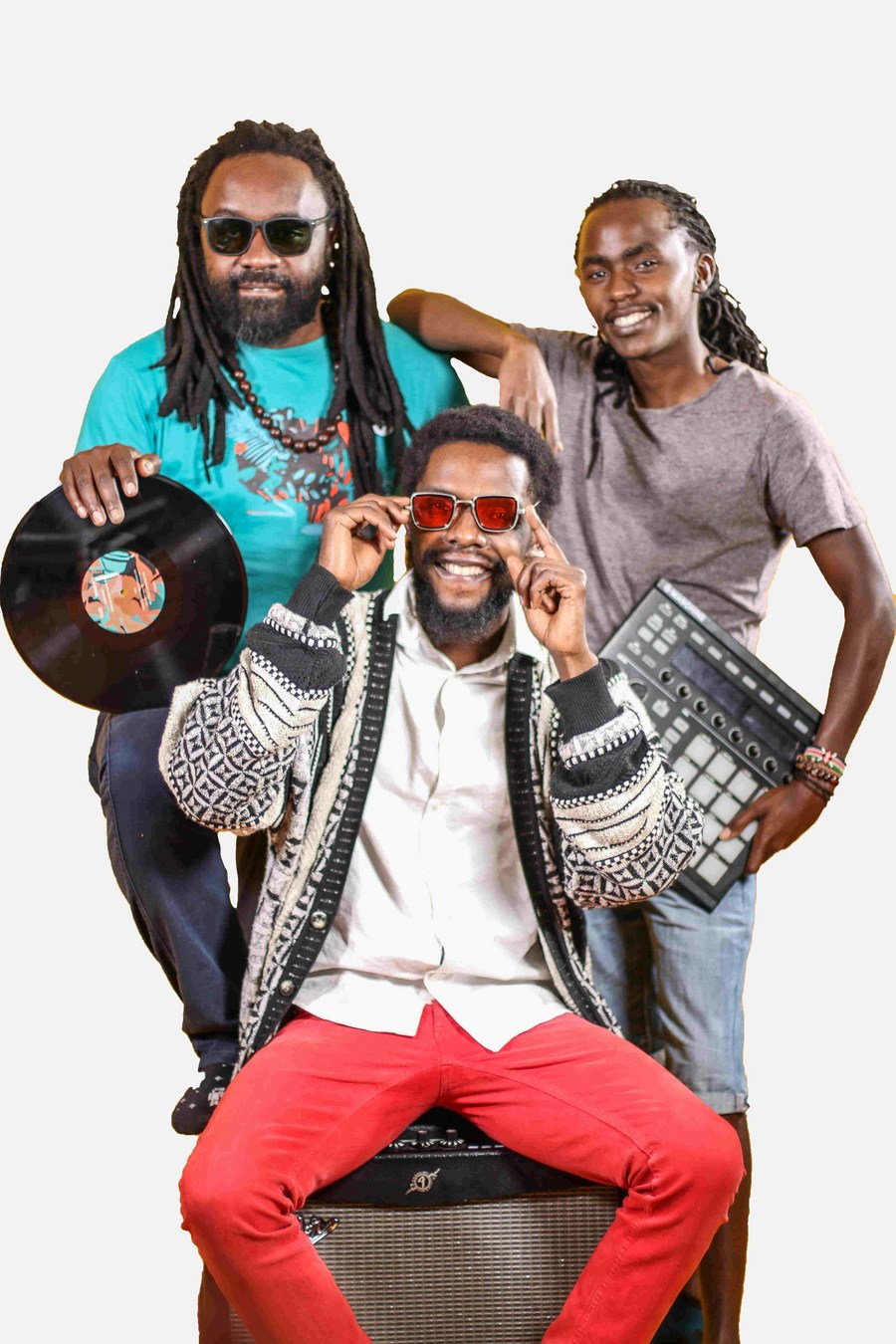
The Bengatronics trio from Kenya pose for a picture in Nairobi, Kenya. (Xinhua/Chrispinus Omar)
Tucked 20 kilometers away from the Kenyan capital, Nairobi, lies the Bengatronics music studio -- an artistically decorated music kitchen boasting intricate types of recording equipment and an assortment of traditional musical instruments.
NAIROBI, March 8 (Xinhua) -- Tucked 20 kilometers away from the Kenyan capital, Nairobi, lies the Bengatronics music studio -- an artistically decorated music kitchen boasting intricate types of recording equipment and an assortment of traditional musical instruments.
In the middle of the room stands a musician crooning a familiar tune with the accompaniment of exotic beats. This sensational type of music is called Bengatronics, Kenya's traditional music interpreted for an electronic context.

A photo of the Bengatronics collective in Nairobi, Kenya. (Xinhua/Chrispinus Omar)
"Around 2011, I began exploring different cultures across the world and the question of Kenya's authentic sound invariably came up. I often wondered whether we had a common sound amidst all the foreign influences. And we did Benga tune," said Mwalimu Gregg Tendwa, founder of Bengatronics and cultural enthusiast.
Benga music has inherently been part of Kenya's heritage developing between the 1940 and 1960s. This fast-paced rhythm is essentially achieved by plucking a lead guitar and the use of percussion instruments.
"What followed my realization was an exhaustive research on how different communities had interpreted the original sound over the years," said Tendwa.
"Then it occurred to me that I can reconcile traditional music (Benga) with contemporary elements to appeal to a national audience as opposed to tribal communities as it had come to be," he added.

A man holds a record inside an old standing music shop in downtown Nairobi, Kenya. (Xinhua/Chrispinus Omar)
The sound is chronicled to have been birthed by the Luo, a Nilotic ethnic tribe residing around the shores of the great Lake Victoria who played their traditional songs on novel music instruments introduced by returning World War Two soldiers. The sound was further shaped by other musicians from across the world including Jean Bosco Mwenda and Edward Masengo, both from the Democratic Republic of the Congo.
However, the dominance of this national tune faded subsequently, which went down from mainstream media spaces to ethnic radio stations. But now, Tendwa is steadily steering the Bengatronics collective constituting of John Udulele as the music director and vocalist while disk jockey (DJ) Mura handles sound engineering to take the hybrid tune across the country and beyond.
On unveiling their newly curated sound between 2014 and 2015, Tendwa said he resolved to present it to a foreign crowd out of a lingering concern of poor reception in Kenya. "In 2015 we performed in Arusha, Tanzania and the crowd loved us, back home we presented the sound in crowds known to us and it was well-received albeit with scepticism. Since then we have performed in international stages and released an album," Tendwa told Xinhua during a recent interview.

A man plays a vinyl tape inside a music shop that has been in existence since 1960 in Nairobi, Kenya. (Xinhua/Chrispinus Omar)
Bespectacled and bushy-haired Udulele whose look is reminiscent of 1980s funk artists, terms their music as progressive and in tune with the current generation who wish to remain in touch with their roots. "Due to our collaborative approach in making music, we tend to work with different artists possessing unique styles, consequently producing divergent music with a wide appeal," said Udulele.
As with every endeavour which will present hurdles, the Bengatronics collective is all too aware of the realities of the Kenyan music scene. They decry the cost implication of making music which often bears minimum returns. Also, they add the reluctance of DJs and other music lovers to innovate and develop new tunes is undermining the potential of Kenyan music.

An assortment of traditional instruments is mounted on a wall inside the Melodica music shop in Nairobi, Kenya. (Xinhua/Chrispinus Omar)
"Our artists are hesitant to explore new sounds while some are convinced that altering traditional sounds would be contaminating it which is far from the reality. Unbeknown to them, tweaking the original form stands a chance to prolong its attractiveness," said Udulele.
Michel Ongaro, a seasoned songwriter, music teacher, and multi-instrumentalist adds that existing musicians ought to release rich, meaningful music as opposed to lyrics embellished with vulgar language. "Our artists need to churn out music which has depth and worthy to be listened to by the young ones," said Ongaro who sees his instruments through his hands after losing his sight at an early age.
At present, a popular urban tune called Gengetone - a conversational rap that borrows some elements of US hip hop and infuses them with dancehall beats is taking Kenyans by a storm with upcoming musicians jumping on the bandwagon. Some notable musicians conquering the international scene with their melodious sounds singing either in their mother tongue or Kiswahili include Winyo and Suzzane Owiyo just to mention a few. ■




